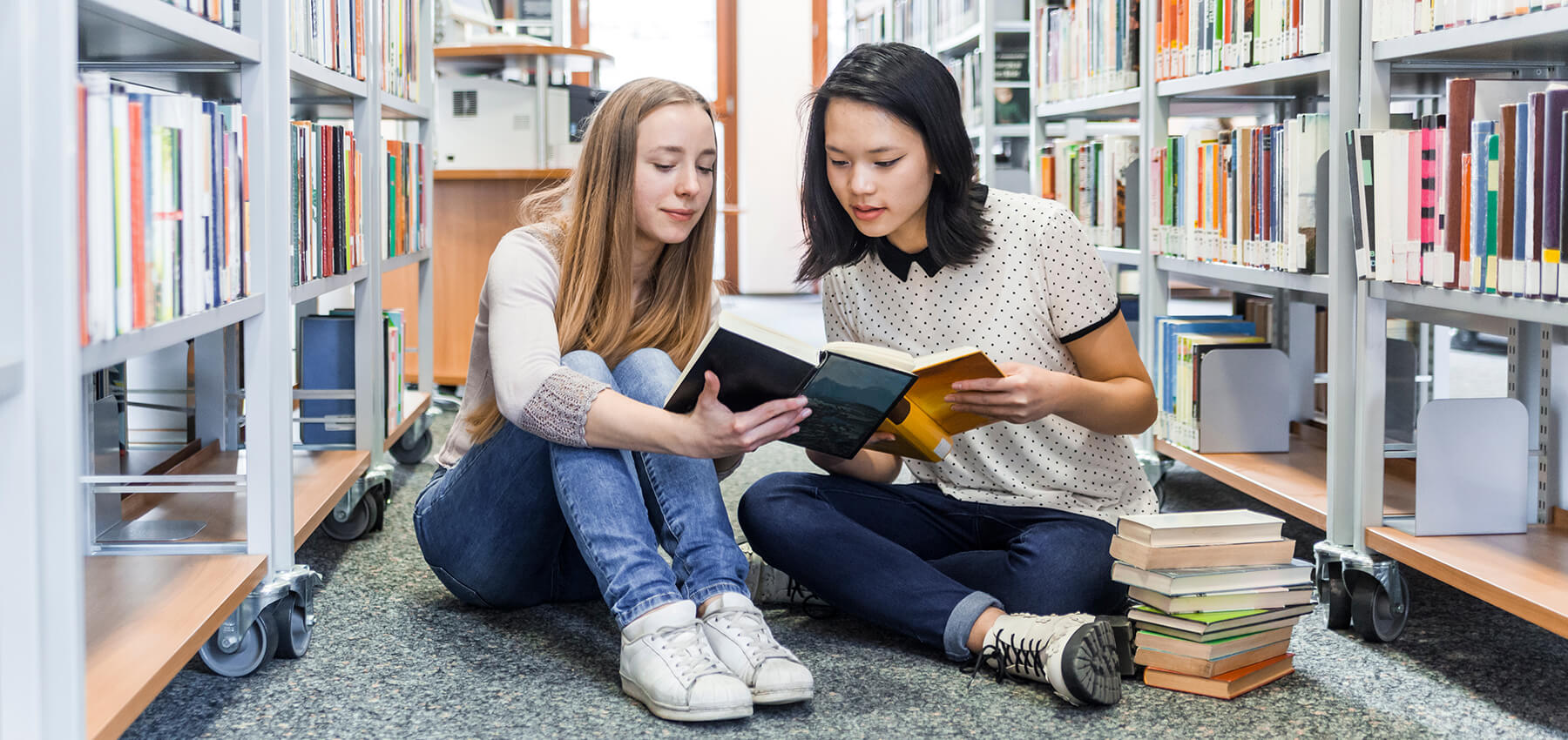Public libraries in Canada offer much more than just books to borrow. They are a space where community members can learn new skills to prepare for the Canadian job market, access important resources, and share a love of reading.
For newcomers to Canada, libraries are not only a rich source of free information but also a bridge to their local community. Many public libraries have dedicated resources and staff who can help new arrivals find jobs, improve their English, build new skills, access settlement advice, read books in their native language, and connect with others in their neighbourhood.
Here’s how public libraries can help newcomers to Canada.
In this article:
- What are public libraries?
- Valuable resources for newcomers at the Toronto Public Library
- How to access Toronto Public Library resources
- Other public libraries in Canada
- Public libraries are a valuable resource
| Want to know more about Canadian culture? See Learn about Canada with these books for adults and children for a list of 16 stories about the Canadian culture and landscape. |
What are public libraries?
Canadian libraries have had a long history. The earliest libraries date back to 1606 and were private book collections that belonged to newcomers from Europe. Canada’s first publicly funded libraries began in 1883. Today, public libraries provide free and equitable access to the following types of services to all Canadians:
- A physical and electronic collection of books, music, newspapers, magazines, and films available for the public to borrow or reference. It includes materials in a variety of languages, reading levels, and formats such as large print, braille, and audio.
- Public access to computers, internet, and other digital resources
- Community programs that promote literacy, learning, and programs for children and youth
- Rental space for meetings, events, and exhibits
Valuable resources for newcomers at the Toronto Public Library
The Toronto Public Library (TPL) is the largest public library system in North America. The library has a rich history. It began in 1810 as a private subscription library and when the City of Toronto was formed in 1834 the library became known as the Toronto Mechanics’ Institute. Its purpose was to educate workers and provide classes ranging from music to science to architectural drawing. The Free Libraries Act came into effect in 1882 and one year later, Toronto established one of the first free public libraries in Canada.
The Toronto Public Library operates a network of 81 neighbourhood libraries, 17 district libraries and two research and reference libraries. The city also offers online resources and bookmobile services.
Some of the services available through the Toronto Public Library include:
- Borrow books, music, movies, and musical instruments
- Download eBooks, digital magazines, movies and music
- Access eLearning resources and online help with homework for students in Kindergarten to Grade 12
- Reserve a computer at any library branch
- Borrow a Museum & Arts Pass to access Toronto museums free of charge, including the ROM, AGO, and Toronto Zoo
- Access technology through their Digital Innovation Hubs
- Access newcomer services and resources, including career and settlement support
The largest library in Toronto is the Toronto Reference Library, which is located close to Bloor and Yonge Street in downtown Toronto. The library spans five levels and contains millions of resources. It includes a section of rare books, including books and manuscripts about Arthur Conan Doyle and Sherlock Holmes, a gallery with free exhibits, piano practice rooms, a cafe, a writers’ room, and a used bookstore.
Newcomer resources at Toronto Public Library
Toronto Public Libraries have a range of resources specifically designed to help newcomers to Canada. Some of the services you can use free of charge include:
- Access to settlement workers—Talk one-on-one with a settlement worker online or over the phone and get help with starting your new life in Toronto and Canada. This free service can help you in finding a job, learning English, and getting a driver’s licence.
- Career and job search—TPL partners with social service agencies to offer free career workshops in areas such as optimizing your job search success and resume writing.
- Personal Finance programs—Access a wide range of personal finance workshops and seminars, led by financial experts. Topics include first-time home buyers, retirement planning, Tax-Free Savings Accounts (TFSAs), and investing.
- Computer skills—Learn to upgrade your basic computer skills, navigate the internet, learn Microsoft Word, PowerPoint, and Excel, or digital design and coding.
- Online tools for learning English—Practice improving your basic English in a welcoming, free online class.
- Community groups—TPL offers a wide range of community groups to help newcomers build social connections, including book clubs and writers’ groups, craft activities, and hobbies such as gardening, knitting, and bird watching.
- Books and movies in your language—Access books, movies, music and other digital content in over 40 different languages. You can search online by language, or find out if your local library has books and movies in your language.
How to access Toronto Public Library resources
With 81 neighbourhood libraries, it’s likely there’s a Toronto Public Library branch near you. Visit the Toronto Public Library website to find your closest library branch, and get more information on hours of operation, address, how to get there on public transit, and the types of services available.
How to register for a library card
While anyone can visit a public library, if you wish to borrow books, videos, or other digital material, you’ll need to register for a library card. To be eligible, you need to live, work, go to school, or own a property in the City of Toronto.
To register, visit any library branch and bring along identification that verifies your name and address. Your library card will be valid for one year. After that, you can renew your library by visiting a library branch in person, or you may be eligible to renew it online.
Accessing library resources online
With a valid library card, you can also access a range of online resources. These services include practice tests, business and career directories, and article databases.
Newcomers to Canada can benefit from the following practice tests:
- Road to IELTS – General Training—Online interactive activities, practice tests and answers for the general test.
- TenseBuster—Lessons and practice tests to help improve your English.
- LinkedIn Learning—Build your career skills and access over 16,000 video courses on subjects ranging from web design to software development to project management.
Other public libraries in Canada
Toronto isn’t the only city in Canada with an outstanding public library system. Across the country, you’ll be able to access books, online resources, and community programs at a local library. Here are a few other public libraries in Canada:
Vancouver
The Central Branch of the Vancouver Public Library (VPL), located in Library Square, was designed as a postmodern take on the Coliseum. This beautiful library houses reading material for adults, teens, and children in 16 languages, including Arabic, Chinese and Vietnamese. Visitors can also access over 120 magazines, music, videos, a collection of musical instruments, and board games.
The VPL offers a variety of services specifically for newcomers to Canada. They include:
- Immigration and settlement—The Skilled Immigrant InfoCentre helps you find a job, explore careers, or start your own business.
- English as an additional language—Take part in a conversion circle to help improve your English and learn about the community.
- Resources for Chinese immigrants—Information on living, studying and working in British Columbia for newcomers from China.
Montreal
The Bibliothèque et Archives nationales du Québec or BAnQ offers dedicated Services for newcomers, where you can get access to practical information to familiarize yourself with the institutions, public services, culture, climate and history of your new environment, as well as to support your search for a job or a place to live. French conversation workshops are also available for newcomers looking to practice their French language.
The Grande Bibliothèque in Montreal is a stunning 33,000-square metre building located in the Latin Quarter. The contemporary building houses over two million books, as well as an extensive collection of multimedia. The library has 13,000 armchairs for reading, 850 study areas, and 350 computer stations. There’s also a children’s library in the basement, with activities for toddlers and young children.
Halifax
The Halifax Central Library located on Spring Garden Road in the heart of Halifax is known as “the city’s living room.” Some facilities available include an extensive collection of books, two music studios, 120 computers, a video gaming station, and a rooftop patio that overlooks the city. The library also has a First Nations Circle that celebrates First Nations culture, a local history room, and a 300-seat auditorium that’s used for lunchtime concerts and readings by authors.
The Halifax Public Library has a range of resources for newcomers including:
- Books in other languages—Including Arabic, Chinese, Farsi, Hindi, Japanese, Korean, and Spanish.
- English Conversation Groups—Practice speaking English, learn about the community, and make new friends.
- Cultural access pass—Free access to museums, art galleries, and historic sites for new Canadian citizens.
Public libraries are a valuable resource
Public libraries are an integral part of Canadian culture and a valuable resource for newcomers who wish to improve their English, learn new skills, chat with a settlement worker, meet other people in their community, or simply enjoy a good book. All you need is to apply for a library card and you can access a vast array of free services!





